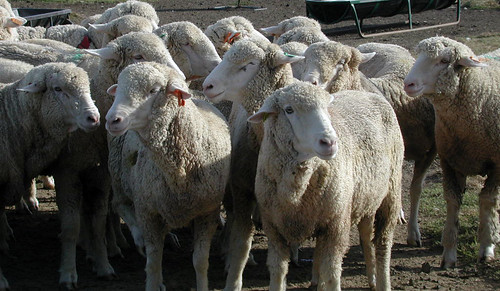The U.S. Meat Animal Research Center (USMARC) in Clay Center, Nebraska, has discovered a gene (TMEM154) that affects susceptibility to OPP infection. There are three major variants of the gene, called haplotypes 1, 2, and 3. In more than 8000 sheep tested, 97 percent had some combination of these three haplotypes.
Haplotypes 2 and 3 were strongly associated with OPP infection and considered to be "susceptibility alleles." One copy of the haplotype 2 or 3 was needed to increase susceptibility to OPP infection.
In contrast to ewes with one copy of haplotype 2 or 3, those with two copies of haplotype 1 were many times less likely to be infected. The findings were confirmed with the help of scientists at the Animal Disease Research Unit in Pullman, WA, and the U.S. Sheep Experiment Station in Dubois, ID.
In collaboration with GeneSeek©, USMARC is developing a TMEM154 genotyping test for commercial use. The aim of the test is to correctly determine the TMEM154 haplotypes for each animal tested. The test is expected to be available to producers in May 2012. As research continues, genetic guidelines for reducing the incidence of OPP infection will evolve.
Ovine progressive pneumonia (OPP) causes an incurable, slow-acting, wasting disease that affects millions of sheep worldwide. The disease affects multiple tissues, including those of the respiratory and central nervous system.
In North America, OPP is one of the most costly diseases affecting sheep due to decreased productivity, "hard bag", lameness, and early culling of ewes. Once infected, sheep are carriers throughout life.
Source: Research on genetic susceptibility to ovine progressive pneumonia at the USDA Meat Animal Research Center (USMARC), Clay Center, Nebraska
Editor's note: CAE (caprine arthritic encephalitis) is a similar lentivirus that affects goats. Cross infection is possible.
Haplotypes 2 and 3 were strongly associated with OPP infection and considered to be "susceptibility alleles." One copy of the haplotype 2 or 3 was needed to increase susceptibility to OPP infection.
In contrast to ewes with one copy of haplotype 2 or 3, those with two copies of haplotype 1 were many times less likely to be infected. The findings were confirmed with the help of scientists at the Animal Disease Research Unit in Pullman, WA, and the U.S. Sheep Experiment Station in Dubois, ID.
In collaboration with GeneSeek©, USMARC is developing a TMEM154 genotyping test for commercial use. The aim of the test is to correctly determine the TMEM154 haplotypes for each animal tested. The test is expected to be available to producers in May 2012. As research continues, genetic guidelines for reducing the incidence of OPP infection will evolve.
 |
| OPP-infected ewes are 20% less productive (USMARC). |
Ovine progressive pneumonia (OPP) causes an incurable, slow-acting, wasting disease that affects millions of sheep worldwide. The disease affects multiple tissues, including those of the respiratory and central nervous system.
In North America, OPP is one of the most costly diseases affecting sheep due to decreased productivity, "hard bag", lameness, and early culling of ewes. Once infected, sheep are carriers throughout life.
Source: Research on genetic susceptibility to ovine progressive pneumonia at the USDA Meat Animal Research Center (USMARC), Clay Center, Nebraska
Editor's note: CAE (caprine arthritic encephalitis) is a similar lentivirus that affects goats. Cross infection is possible.

No comments:
Post a Comment